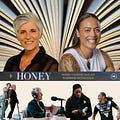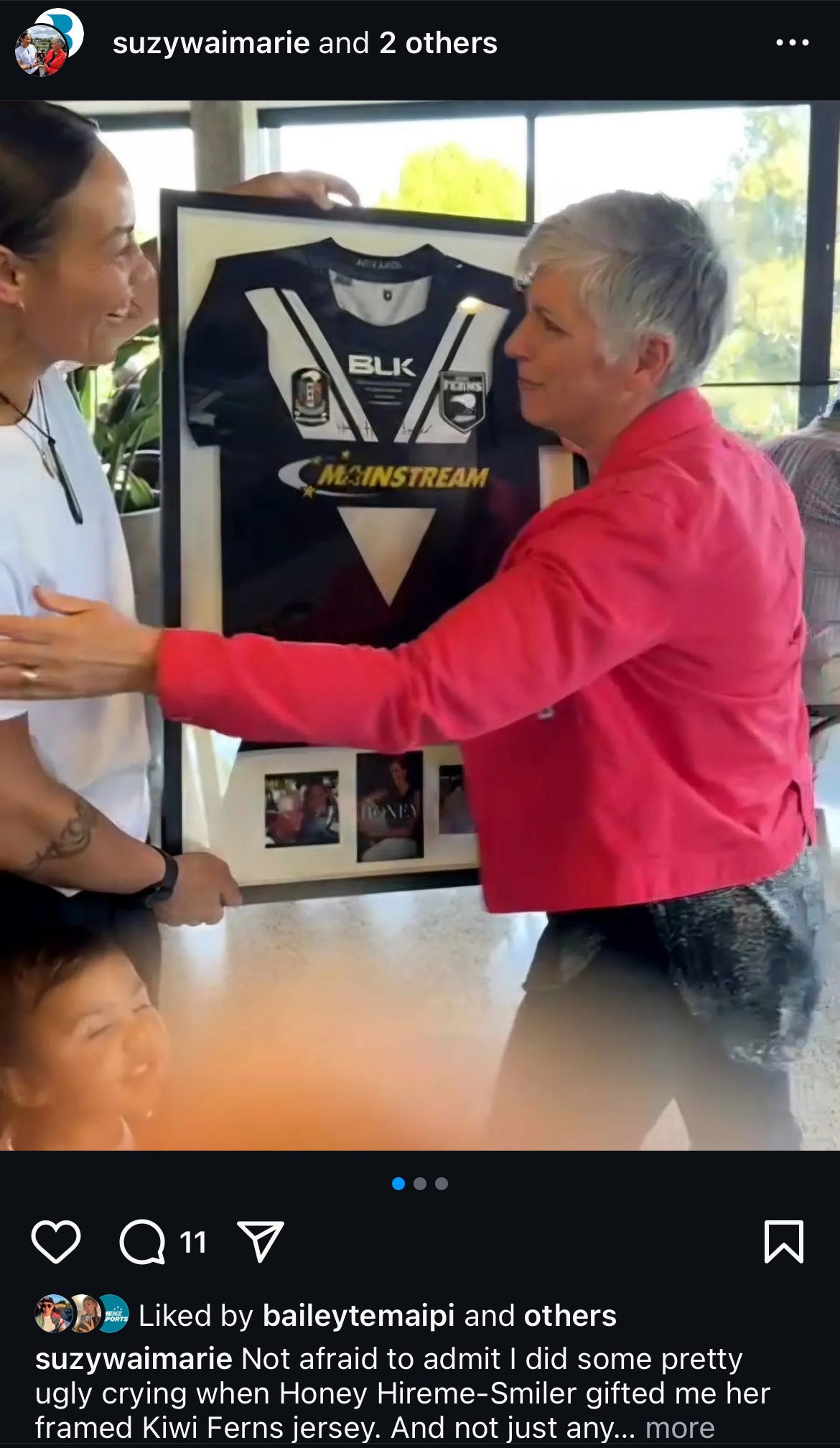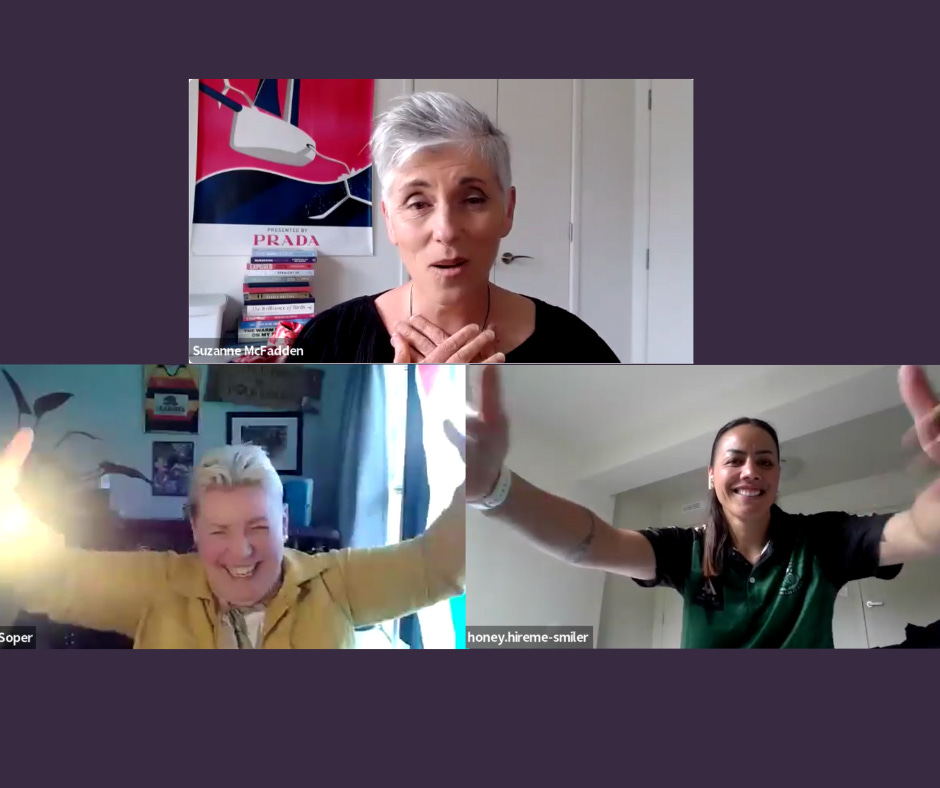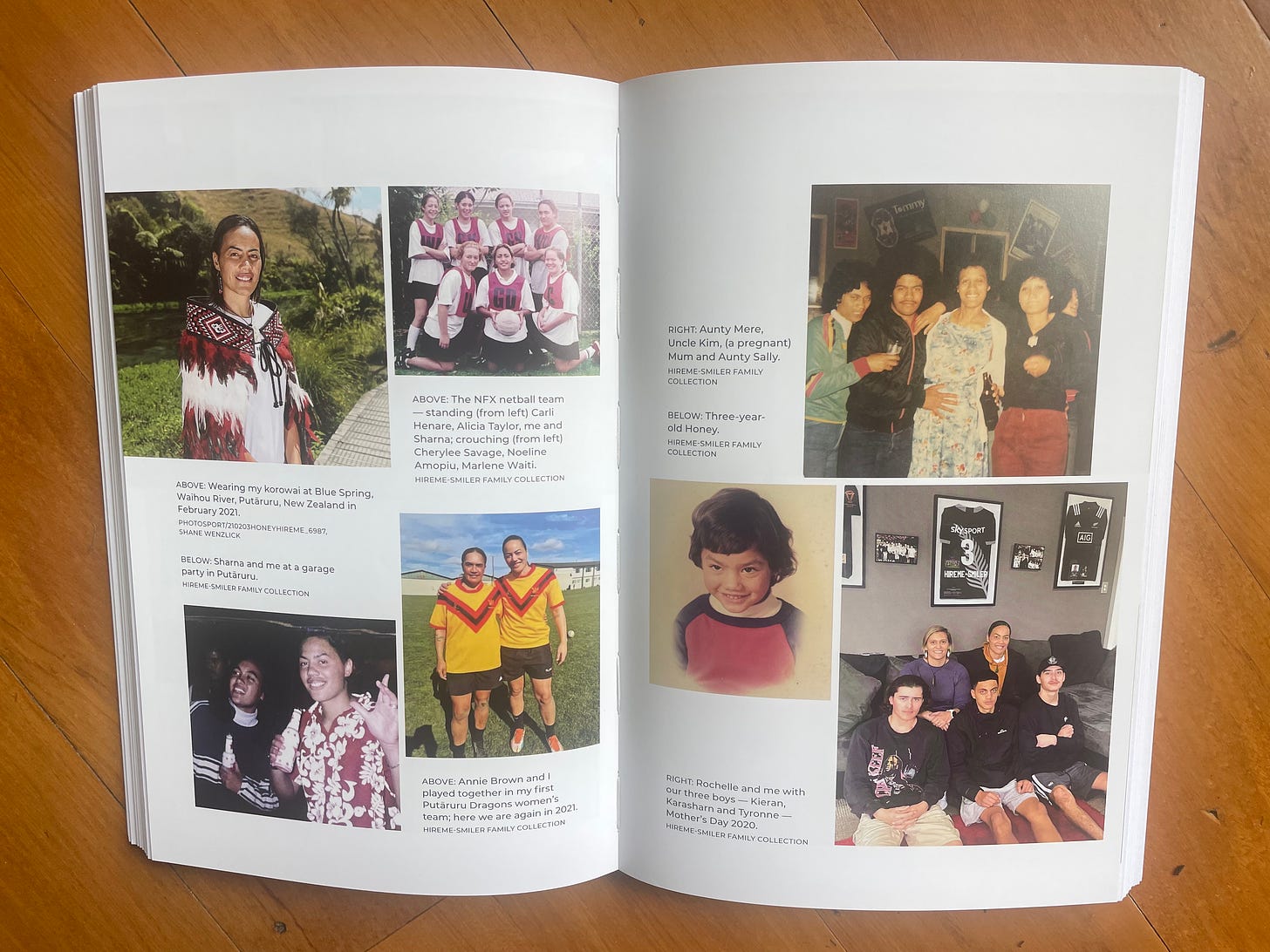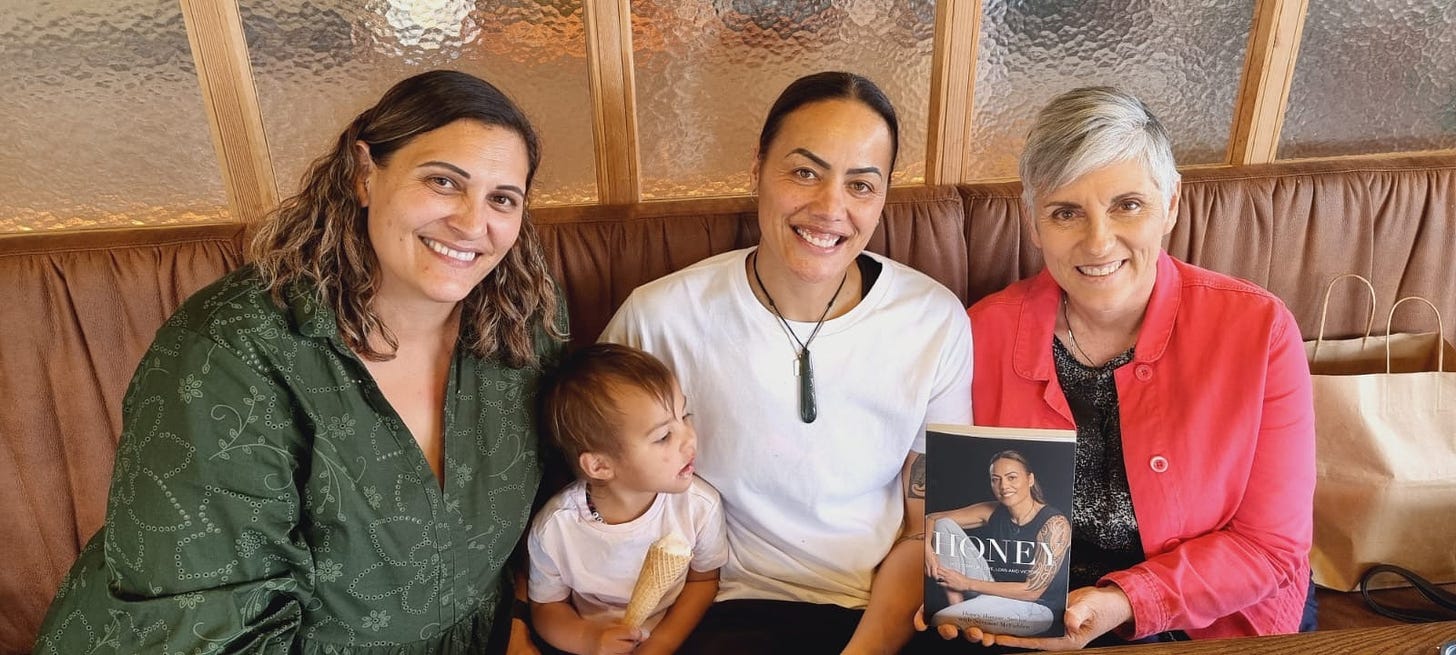I am lucky enough now to be someone who is occasionally added to publicity lists. This meant I was sent a copy of Honey Hireme-Smiler’s memoir, Honey: My Life Story of Love, Loss and Victory. It’s my friend’s life story written by another friend and my first real editor Suzanne McFadden aka Suze.
I could not have been more of a target audience for this book. Pulled together by two wāhine I deeply admire, I was always going to do my part to hype it up. I’m not certain I would have written about it at length though until I saw this post.
My heart strings now sufficiently twanged, I knew I wanted to talk to them about their collaboration. In particular, navigating the passages of grief, violence and less than ideal life choices. I wanted to learn about the relationship that was forged in between the lines of the story they told.
So I asked them both to join me on a zoom. Suze, entered off the back of an interview with Dame Shoulders- Sorry, I mean, Dame Lisa Carrington.
As we waited for Honey, I admitted to Suze I was pretty anxious to interview her. She’d now bear witness to the butchery behind the sausages I’d been serving her as my editor. While we waited for Honey, I asked this long time champion of women’s sports about the sudden uptick in women’s sports memoirs.
“20 years ago, I was approached to write Yvonne Willering’s book.” Suze explained. “She wanted to write her story. We went to five or six publishers, and they all said, ‘Nobody buys women's sports books’, and that was the end of that.”
“Even though she was topical and she was going to speak her mind about netball, Netball New Zealand and the Silver Ferns. They just said, ‘Nobody will buy it’ and that ‘Women buy sports books to give to men’.”
That alone should make you go out and immediately purchase this book for all the women in your life, just to prove a point.
Honey has now joined us from the hubbub of an Under 14 Māori girls league camp. So I kicked them off with a first question and then watched them fall into their rhythm.
For the purpose of clarity and length, this has been edited. I’ve put Suze’s words in italics to differentiate their two voices but they wrote this book together so it just seemed right that they tell this story together too.
Alice: When you first said, ‘Oh yeah, I'm going to do this’, how does this book compare? Is it what you thought you were going to end up putting on the paper?
Honey:
Nope.
I thought I was just going to talk about rugby, rugby, rugby. We won this, we lost this, I was shit at this, I shit at that and it was going to start and stop there. But I have to credit Suzanne and the way we went through that journey. We went to places where initially, I was very reluctant to go. I'm so glad that we did because the book is probably 30% about sport and 70% about everything else that I've done.
I think it shows the substance to me in that, you can have all these labels or titles under your name and all of that but actually, there's a whole lot behind Honey that people don't maybe see or know about.
Suzanne:
I was never going to let her get away with it just being a sports book because I knew parts of her story. I didn't know all of her life when we sat down though and it was a bloody emotional roller coaster- That’s what we call it, aye Honey?
We were laughing and we were crying but that’s Honey’s story. That's who she is. I really wanted to make sure that it was there, warts and all. I am so proud of the way that she came through this. Even though she talks about being reluctant, she was never reluctant when she sat down with me. Every Friday at 8am, we'd sit down here for two hours. She was just so eloquent and so open. Thank God because I couldn't have written a book without her being like that.
Pajamas and all (they both laugh).
I don't know that I was prepared for those conversations, those adult conversations, with my dad. But the book forced us and actually we found growth through the journey of this book together. Having to revisit some of those moments as kids, how it felt for me and how it felt for him. How I remembered it and how he remembered it. It forced us to go through that and I'm grateful for that. It definitely was very healing. Not just for me, actually for my siblings as well.
I've had all three of my brothers read the book in the space of 24 hours. Two of them aren't readers at all but they said they could not put it down. They read the whole thing from cover to cover and they went through the emotions with me as they read the book. They remembered things, they cried, they laughed. But the outcome of it is, again, for them, very healing.
We went through a few drafts of those chapters. I think when we started off with one in particular and it was quite graphic. Honestly, I found it so hard to write it down. I don't know if I told you this, Honey, but when I started to write it, I went into Eugene's office (Suzanne’s husband) and was crying and said, ‘I can't be Honey today’.
Suze sent me the draft and I was just like, this is really harsh. I felt like I was reading the emotion that I was going through at the time. This is me expressing it and it's very, very raw. I probably needed to go through that moment to then start stripping it back and telling the story how I wanted to. Keeping those parts for me, I don't need to take anybody else through that. Those parts are just for me, for my whānau. I got guidance from those who are closest to me, from my wife, from my brother, from my dad, to ensure that I was respectful to them.
I hadn't actually said those words out loud. This has been sitting way down in my guts for ages and I haven't had conversations with anyone about it. I just squashed it and tried to forget about it. So then I had to say them out loud and then that felt good. Then I had to read about it and it was even more confronting. Then read about it again and again and again as we edited it until I was comfortable with what was actually going out to the public.
There were stories that Honey has told so many times, but then it's my job to ask her more, to just go a little bit deeper. I did lots of research beforehand but you never want to do too much research though or else everything will just be stayed and flat. So you just ask. And it was my job to just keep asking and asking. Pushing her a little bit further all the time.
I haven't ghost written a book before so I was really scared when I started that it would sound like Suzanne talking. It was so important to me that it was Honey's voice. I’d go and check everything with my husband because he's a great journalist and writer. So I go and say to him, ‘Does this sound like Honey or does this sound like me?’.
But as we got into it, her voice became louder and louder. It's a challenge to make sure that you don't start writing it like you would speak but I think the more you do it, it snowballs. It gets bigger and bigger. I remember when I'd finished that very first draft, I was like, ‘Oh, I'm sad. I'm not Honey, today.’ I really missed being you. You're so much cooler than my life.
It’s actually the main feedback that I've gotten in the week that the book's been out, is that it really sounds like you. It sounds exactly how you're thinking. There were probably times where I was trying to tell a story and then I'd fall into that protective mode and I wouldn't really bring my whole self. But Suzanne was able to bring it out anyway and tell it how I would tell it. Then I got to read and be like, ‘Oh, that's exactly how I wanted it to come out’. But I was just falling back into little Honey, let's be protective.
I knew what you wanted to say. And the more time I spent with you, the more I knew how you thought. Before that I had no idea what was in your head. But now I know what it's like, it's a bit messy and very busy.
Something that played on my mind, my story's not finished so should I be writing this story? But I thought I've gone through a bit already. Let's just get this part out and then see what happens. I didn't want it to sound like it has a happy ending or a really sad ending because I don't have an ending right now.
There's that danger that if you do wait too long in your life to do it, people will forget who you are. You've got to kind of strike while the iron is hot. But I do think that what made your book different is that, yes, you had finished playing sport, but then your life continued in totally different areas. I think that if you'd approached me as soon as you'd finish playing, I'm not sure that I would have said yes.
Your sports story, that was always at the centre, but it's all the other stuff around it that I love the most. You have done so much since you retired. It’s incredible and still going. I think that was the lovely way to round it out was saying, ‘Okay, my sport ended there, but my life hasn't ended’. And sport may have instigated a whole lot of these things that I do now. But athlete Honey and all the other Honeys are related, but quite different.
I’ve walked past a couple of bookshops now and been like, ‘Oh, where's my book? I can't see it’. And then they're like, 'We don't have any more copies’. Tokoroa Warehouse sold out immediately. That’s my whānau, there’s no bookshops in Pūtaruru so they've gotta go to Tokoroa. Their warehouse sold out on day one. Now it's been a whole week and it's sold out again. It's those kinds of things that, I’m not ashamed to say, make me proud.
When it's a book, it's the permanence of words. That people are going to quote you back and hold you to account for what you've written in your book. I was worried about people using that to come at me, to target me, to judge me, to look down on me, whatever it was.
I still am very nervous when people say, ‘I got your book’. I'm like, ‘Oh my God, here they go’, it makes me really anxious. Like, what am I? What have I said? What I've done to you? How has it made you feel? I'm really anxious to get people's feedback on it. The more that comes in, it's helping me settle and be like, we've done a good job.
On Sunday, I was running around the lake and there was a farmer's market in Hamilton. I go to this little coffee pie cart thingy and the guy standing there is waving out to me. He goes, ‘Remember me from school? You and your brother owe me a skateboard. You asked to use my skateboard at the skatepark in Pūtaruru and you didn't give it back to me. You just broke it and laughed’. I was just like, ‘Sorry bro, did you read the book?’ And he goes, ‘what book?’.
It was just uncanny that he saw me at this time. And I was thinking, that the Herald article just came out with a big headline calling me a bully. I said to him, ‘Bro, instead of having two coffees, I'll have 10. I'll pay you back in coffees’. And he just laughed.
I want people to see there's always like real human beings behind what they might see in front of them. Or who they might perceive somebody is when they might see a headline or on telly or see that you're a former sports representative. That there's actually a whole lot of human behind those people.
We all look for heroes and heroines and we think that they're just there. That they're there as these amazing people that just had this nice straight line, nice cruisy road to where they got to and how they achieved that. But actually there's a whole lot of substance that goes in behind that and I want people to see that. I want people to see that and also to be inspired to tell their own story. Because people just don't think that their stories will help people and they will. They will absolutely help.
I want more stories out there because we grew up in a generation where we didn't have those role models. We didn't see them right and now we have the opportunity to be able to start tell our stories a lot more so that people can. And I'm not saying I would guarantee you this team of 25 under 14 year old girls will read it. Not one of them will probably read my book in the next 12 months, but they might pick it up in the next five years, right?
I haven't let a hard life make me hard. I've probably gone the opposite way. I have had a hard life and it softened me a whole lot. It's opened me up too. The only thing I've really had to hold on to through a lot of these challenges is hope. Because if I didn't have hope, I'd have just quit. I'd quit, I'd have walked out, I'd have just stayed in my grief. I would have just stayed in my anger. I would have just stayed in life sucks and I keep getting all these shitty cards, so I'm done with it.
I could have stayed there, but I don't know. Just holding on, pushing through and holding on to hope. That's really the only thing I can hold on to. You have to choose one or the other. I think through all these hard times, I've chosen hope. I think through the journey of the book, living it and telling it as it's happening, has helped me to stay within my hope.
I absolutely know that there's a positivity part that I have to play in that as well. But I think more importantly for me is to stay real. To stay real and that the book helped me to bring that out. To not drop back, to not rest on my laurels. I can't change a lot of the things that I've been through, I can't change the cards that have been dealt to me at the moment. And so I'm just going to get on the horse and keep riding and see where it takes me. You just gotta get on with it.
I think generosity of spirit is the one of the best virtues that you can have and that's what I learned from Honey. You can be the greatest league player, the greatest rugby player, but if you don't have that kindness, that generosity, that beautiful wairua that she has, what does it all mean?
I might die being known as the woman who wrote Honey’s biography, that'd be really cool. But I would rather have on my headstone that she was a good person. It's wasn't actually through the writing process that I found that out. It was through the process of talking to someone about their life, every week for two hours, and getting to really know somebody who I now think of as my really good friend.
We've just have this beautiful bond now and I realised, yes, you can win sports journalists of the year. You can write a book, you can be an editor of this, and you can have a podcast, whatever. But if you're not giving yourself to other people, just being kind, just caring whether it's your whānau or beyond that, then you haven't really lived your life well.
It's something that comes to you later in life that you suddenly go, ‘Okay, being a good person is number one’. It's not being famous, it's not making lots of money, it's not having a cool house. It is being loved by people. And that was made even more clear by spending this time with Honey.
Ugh, I adore these two! So now is the part that I encourage you to spend some time with them and read Honey so we can all get on the same page.
You can buy this book here. Buy a copy and let them know women have always loved sport, the women that play them and the women who tell their stories.
With you,
Alice

